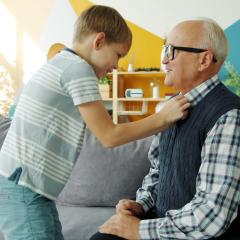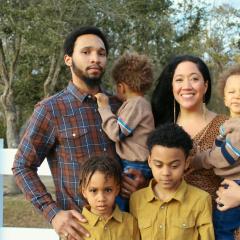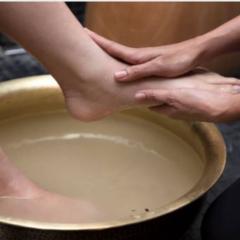Radio programme includes v1-2 (30min)
نامۀ اول پولُس رسول به تیموتاووس
فصل پنجم
رفتار ما با ایمانداران
۱ یک مرد پیر را سرزنش مکن، بلکه او را همچون پدر خود تشویق نموده و با جوانان مانند برادران خود رفتار کن. ۲ همین گونه با زنان پیر، مانند مادران و با زنان جوان، مانند خواهران خود با کمال پاکدامنی رفتار کن.
بیوه زنان
۳ بیوه زنانی را که واقعاً بی کس هستند، کمک کن. ۴ اما آن بیوه زنانی که دارای فرزندان و یا نواسه ها هستند، بگذار که آن فرزندان و نواسه های شان یاد بگیرند تا اول در برابر خانوادۀ خود وظیفۀ دینداری خود را انجام داده و مسؤولیت نگهداری آنها را به دوش گیرند، زیرا خدا از این کار خوشنود می گردد. ۵ کسی که واقعاً بیوه و تنهاست، به خدا توکل دارد و شب و روز به مناجات و دعا مشغول است. ۶ ولی آن بیوه زنی که عیاشی می کند، حتی اگر زنده باشد، در واقع مُرده است. ۷ این چیزها را برای شان بگو تا ملامت نگردند. ۸ اگر کسی امکان زندگی را برای نزدیکان خود، به خصوص خانوادۀ خود فراهم نکند، ایمان را انکار کرده است و چنین آدمی بدتر از یک بی ایمان می باشد.
۹ تنها نام بیوه زنی باید ثبت گردد که از شصت سال بالاتر عمر داشته و به شوهر خود وفادار بوده باشد. ۱۰ علاوه بر این آن زن باید در امور خیریه، از قبیل پرورش کودکان، مهمان نوازی، خدمت به ایمانداران با فروتنی و کمک به ستمدیده گان سهم گرفته و خود را وقف هر نوع نیکوکاری کرده باشد.
۱۱ اما بیوه زنان جوانتر را ثبت نام نکن، چون وقتی که خواهشهای نفسانی آنها را از مسیح دور سازد، علاقمند به ازدواج می شوند. ۱۲ به این ترتیب آنها ایمان خود را زیر پا نموده و خود را زیر داوری قرار خواهند داد. ۱۳ برعلاوۀ آن، به تنبلی عادت کرده و خانه به خانه می گردند و نه تنها تنبل شده، بلکه غیبت گو هم می شوند. در کار دیگران مداخله می کنند و سخنان ناشایسته بر زبان می آورند. ۱۴ پس من مشوره می دهم که بیوه زنانی که جوان هستند، ازدواج کنند و اولاد بیاورند و خانه داری نمایند تا دشمنان فُرصت نیابند که دربارۀ شان بدگویی کنند. ۱۵ زیرا بعضی از بیوه زنان هم اکنون گمراه شده و به دنبال شیطان رفته اند. ۱۶ اگر یک زن ایماندار، خویشاوندان بیوه داشته باشد، باید به آنها کمک کند تا بار دوش کلیسا نگردند و کلیسا بتواند به بیوه زنان مستحق کمک نماید.
مسؤولیت رهبران کلیسا
۱۷ رهبران کلیسا که خوب رهبری می کنند، مستحق حرمت و پاداش دو برابر اند، به خصوص آنهایی که در کار موعظه و تعلیم زحمت می کشند. ۱۸ زیرا در کلام خدا نوشته شده است: «دهان گاو را در وقت کوبیدن خِرمن نبندید» و «کارگر مستحق مزد خود است.» ۱۹ اتهامی را بر ضد رهبر کلیسا قبول نکن، مگر آن که به وسیلۀ دو یا سه شاهد تأیید گردد. ۲۰ آن رهبری را که به گناه ادامه می دهد، در حضور همه سرزنش کن تا دیگران هم عبرت بگیرند.
۲۱ در حضور خدا و عیسای مسیح و فرشته گان برگزیده، تو را وظیفه می دهم که این تعالیم را بدون تعصب رعایت کنی و هیچ کاری را از روی تبعیض انجام ندهی. ۲۲ در دستگذاری کسی برای مقام رهبری عجله مکن. در گناهان دیگران شریک نشو، بلکه خود را پاک نگهدار. ۲۳ از این به بعد فقط آب ننوش بلکه کمی شراب هم بنوش تا معده ات تقویت شود، زیرا بیشتر وقتها مریض می باشی.
۲۴ گناهان بعضی ها اکنون چنان آشکار است که آنها خود به خود به جزا محکوم هستند اما گناهان دیگران بعدها معلوم خواهد شد. ۲۵ همچنان کارهای نیک عده یی نیز آشکار می باشند، حتی اگر اکنون هم آشکار نباشند، نمی توان آنها را تا به آخر پنهان نگهداشت.







